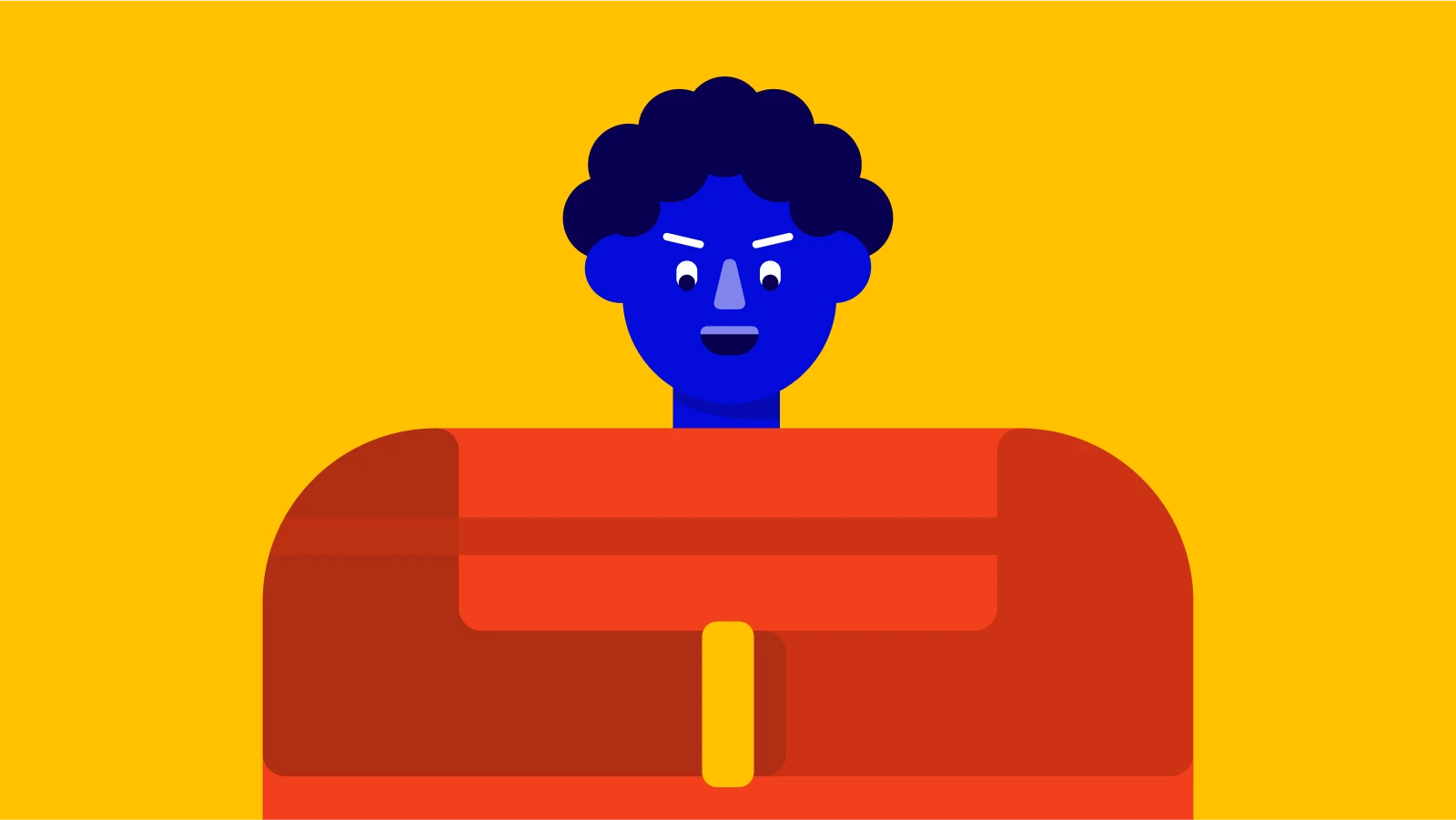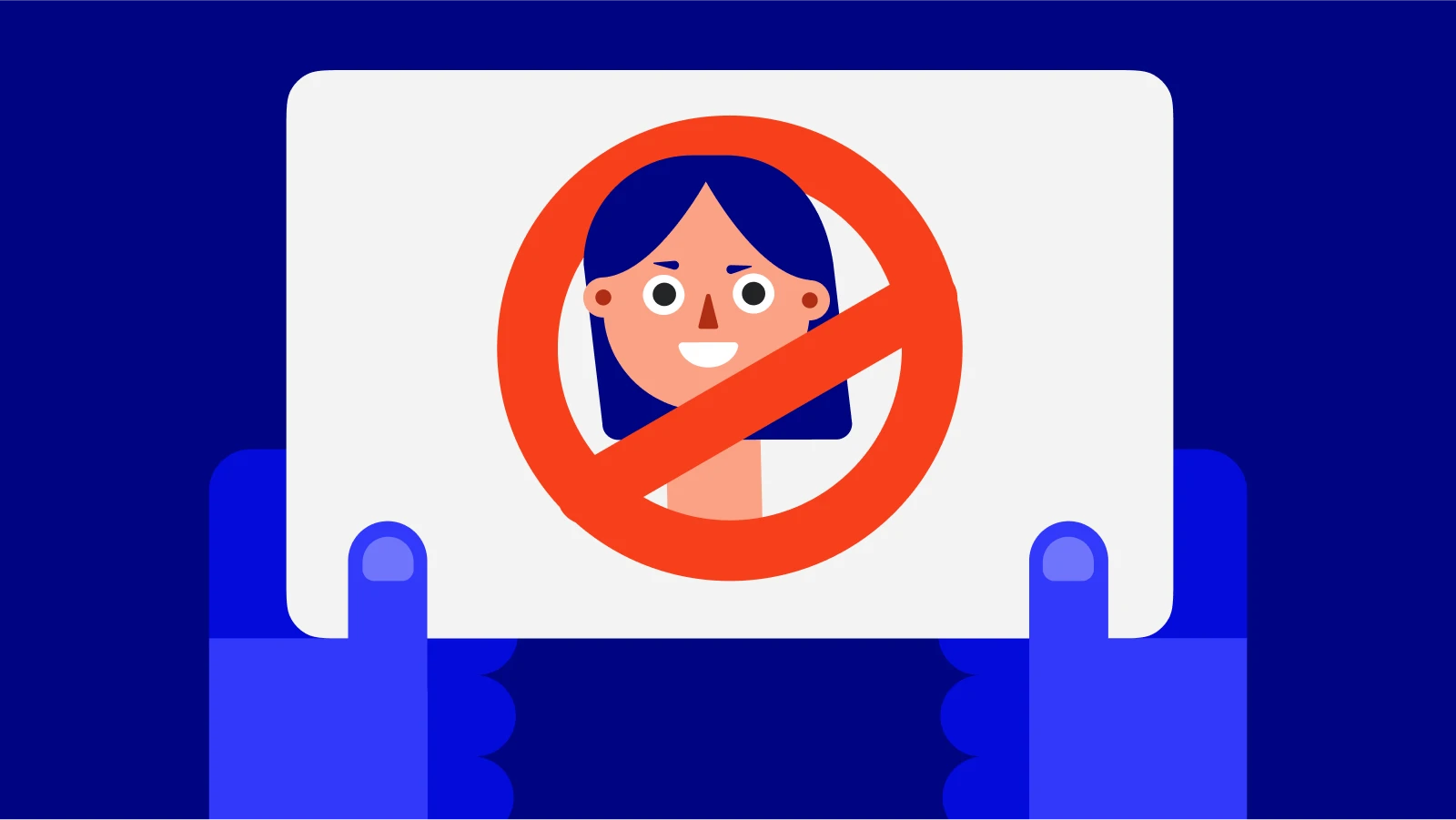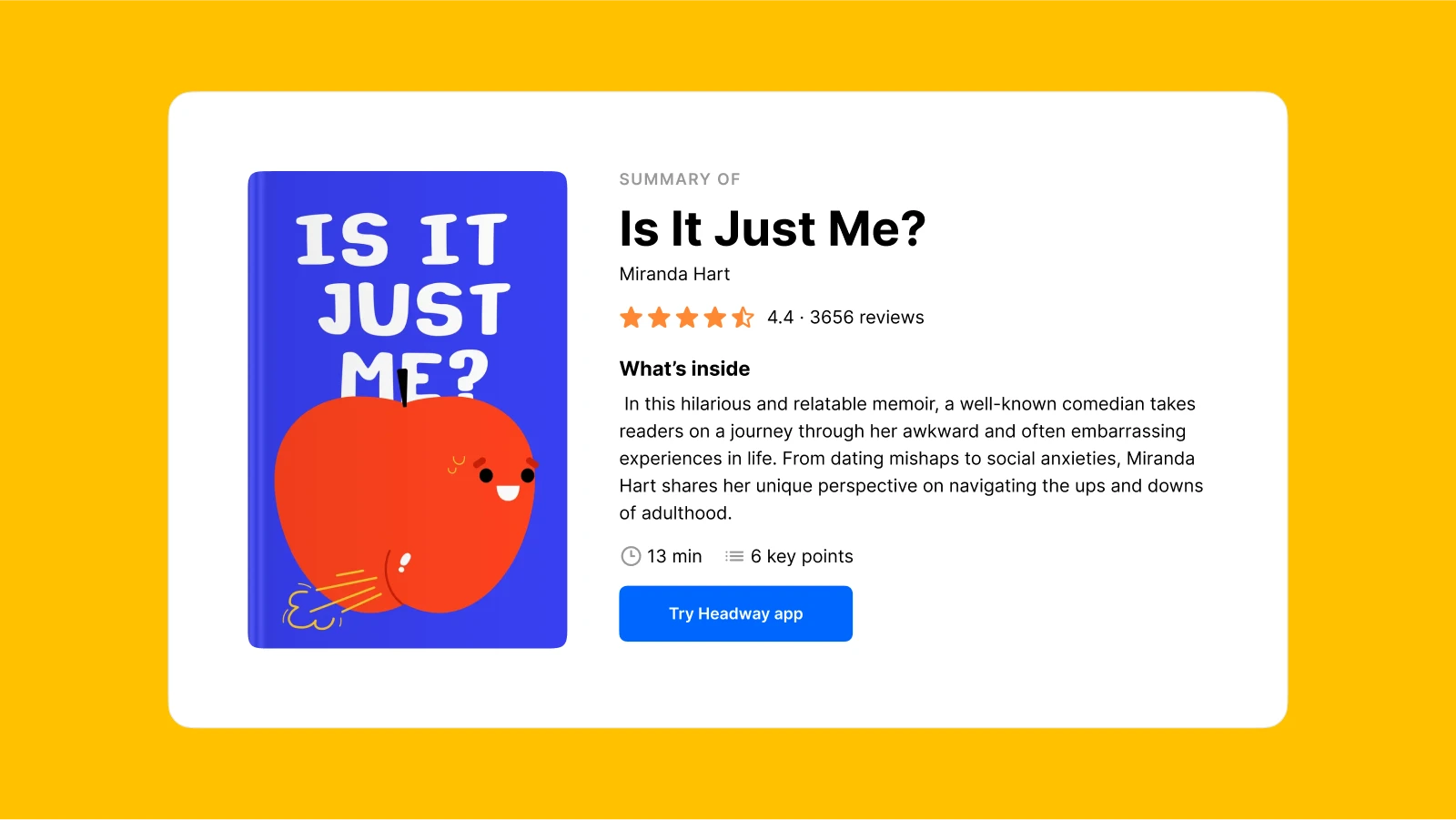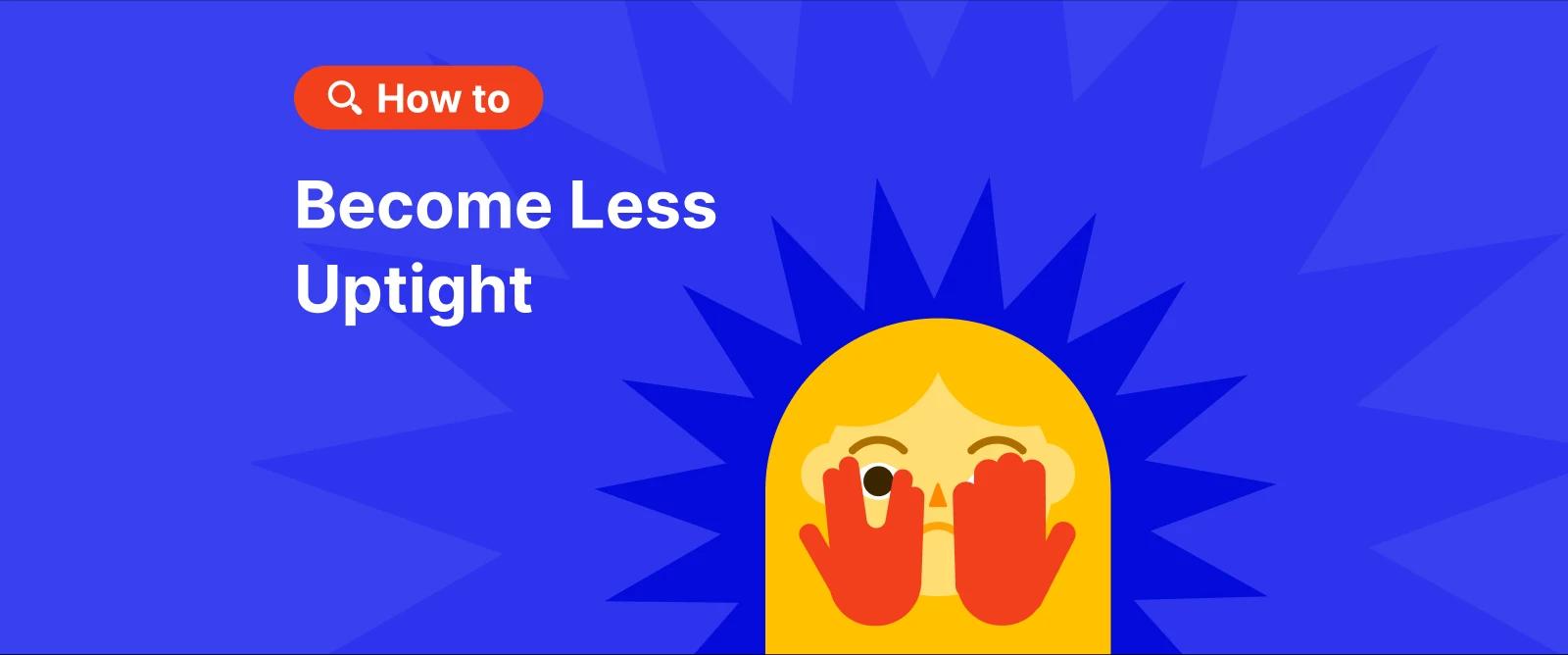Life feels like a constant checklist you can't complete? You're not alone. Learning how to become less uptight, however, can transform your personal life, mental well-being, and improve overall self-esteem.
As an experienced clinical psychologist Jordan B. Peterson suggests in his book '12 Rules For Life,' "Order can become excessive, and that’s not good, but chaos can swamp us, so we drown — and that is also not good. We need to stay on the straight and narrow path." This and other essential tips are gathered in the Headway library of book summaries. Unshackle your mind, enjoy life, and build resilience against stressors with concise, expert-backed reads.
To stop being uptight, practice relaxation techniques, develop self-awareness, let go of perfectionism, and embrace imperfection daily.
In this article, you’ll learn:
8 actionable steps to be less uptight: from deep breathing to embracing imperfection
How uptightness affects your happiness
How to recognize the hidden signs of being uptight
Mental decompression tips from Headway book summaries
Eight actionable steps to be less uptight and enjoy life more
 Ready to break free from daily chaos? These 8 simple yet powerful steps will help you loosen up a bit, let go of control, and live life as it is — with all its flaws and imperfections. Take a small step today and transform the way you experience the world!
Ready to break free from daily chaos? These 8 simple yet powerful steps will help you loosen up a bit, let go of control, and live life as it is — with all its flaws and imperfections. Take a small step today and transform the way you experience the world!
1. Calm your mind with relaxation techniques
When you feel anxiety hitting, your body tenses up on its own. Breathing exercises can instantly help. Practice slow, steady inhales and exhales to calm your nervous system. One effective strategy is the 4-7-8 technique. You need to breathe in for 4 seconds first. Then, hold your breath for 7 seconds and finally exhale for the count of 8. It disrupts the "panic" response and brings you back to the present.
Set aside 10–20 minutes a day to unwind. Try meditation, progressive muscle relaxation, deep breathing, or simply sitting quietly without distractions.
Following Dan Harris' advice in '10% Happier:'
"Meditation can help to find your purpose and teach you the power of the present."
Read the full summary of '10% Happier' by Dan Harris on the Headway app.
Turning these relaxation techniques into your regular habit helps lower stress levels overall, making it easier to handle life's ups and downs.
2. Cultivate self-awareness
Some of us have that personality trait that leans toward cautiousness and deep focus. There is nothing bad in it! But if left unchecked, it can turn into chronic tension and trigger control-seeking behaviors. Self-awareness and consistent mindfulness practice will help your with that. Once you notice patterns, you can consciously choose to respond differently.
3. Stop trying to control everything
Life is messy, that’s for sure. Trying to control everything only adds to your stress. In fact, perfectionism and excessive control keeps you trapped. Accept that mistakes happen, and they are a natural part of self-growth. When you stop obsessing over getting everything "right," you give yourself freedom to try new things and enjoy life without fear.
Instead, focus on what you can control — your attitude, your choices, your reactions. Let go of micromanaging every detail, whether it's at work, at home, or in relationships. Trust that even if things don't go exactly as planned, you'll be okay.
4. Welcome challenge in social situations
Social skills improve through practice, not perfection. Attend events even if they make you nervous instead of scrolling through social media feed. This is a good opportunity to strike up conversations without worrying about "sounding perfect" and hone your public speaking skills to boost confidence. Each small win helps you build resilience and lower self-consciousness over time.
5. Smile more and don't overanalyze
Uptightness often steals joy by making people overanalyze humor or feel embarrassed by silliness. But you know what they say — smile really is medicine for everyone. It helps you approach every single day with a gentle frame of mind and understanding.
As Vietnamese monk and Nobel Prize nominee Thich Nhat Hanh explains in his book 'Peace is Every Step,' starting each day with a smile sets the tone for the following 24 hours and affirms your intention to live with awareness and peace. He then states:
"Just breathing and smiling can make us very happy, because when we breathe consciously we recover ourselves completely and encounter life in the present moment."
Get more insights in the full summary of 'Peace is Every Step' by Thich Nhat Hanh.
Humor loosens emotional tension and strengthens bonds in social situations. So, let yourself laugh freely, even if life isn't perfect.
6. Leave your comfort zone
Self-growth activates when you step out of your comfort zone. Do something intentionally fun and humorous, something outside of what you'd normally do. Trying a new hobby or traveling to a new place are among many ways to do so. Each small risk builds your inner confidence and makes you more comfortable with the unknown.
7. Teach yourself to let go
Have you ever noticed how the need to control everything often comes from a fear of failure? We've all been there — clinging to routines and plans because they make us feel safe. But what if your real strength dosn't come from holding everything in place, but from being able to roll with the punches?
When you finally give yourself permission to let go, it's like a weight lifts off your shoulders. You feel calmer, and that calmness naturally helps you make decisions more easily, without all the overthinking. Suddenly, you're not just more at ease with yourself, but you're also able to connect with others more deeply. You start to trust yourself, even when things don’t go perfectly.
Letting go doesn't mean giving up or becoming careless. It's about trusting that, no matter what happens, you can handle it — and still move forward.

8. Build better habits
James Clear's global bestseller 'Atomic Habits' shows how tiny changes in your daily routine can actually transform your life for the best. The author points out:
"Habits are the compound interest of self-improvement."
Learn more about the power of good habits in summary of 'Atomic Habits' by James Clear on the Headway app.
To build better habits, start by practicing gratitude each night. Take a moment to list three things that made you smile — no matter how small. Next, make downtime a priority by scheduling "unwind time" in your calendar, just like you would any important meeting.
Celebrate your progress, no matter how small, and give yourself credit for every step forward. And when life feels particularly overwhelming, use reset rituals like taking a short walk, practicing deep breathing, or listening to calming music to regain your balance.
How being uptight affects your life
Being overly uptight doesn't just add stress to your life; it holds you back from reaching your goals successfully. When you're stuck in a constant state of tension, you miss out on opportunities to connect deeply with others and enjoy spontaneous moments.
Eventually, your social skills start to suffer as you feel too rigid or awkward in conversations. Your personal life gets affected, too. It becomes weighed down with anxiety and defensiveness, making it harder to build meaningful connections. As you overanalyze every mistake and fear judgment, your self-esteem takes a blow.
The more you try to control things, the more stressors pile up, eventually leading to burnout or even panic attacks in extreme cases. Learning to relax isn't just about having fun — it's vital for your emotional and physical well-being.

Recognize when you're on edge
If you have grown up all your life being overly serious, you may not even realize it. Uptight people are often the last to know that they are so. They carefully curate their lives so that nothing upsets the balance they’ve created. Hence, they appear genuinely shocked when informed of this fact.
"Learn to let go. That is the key to happiness." — Buddha
Taking yourself too seriously really refers to control. Thus, when you feel that inner strain next time ask yourself the following questions: How tightly do I hold on to things around me? How flexible am I with changes? How comfortable am I with an unexpected turn of events? Finally, how willing am I to give up control?
Down to the specifics, here are factors in determining your limits. How well you fare across these items will reveal how much of a control freak you are or not.
Defensiveness
Defensiveness is a red flag when it comes to determining if you are uptight. Defensive people have their claws out at every point. They are dressed, ready for battle, even where there's none in sight. Thus, they have little time for anything else. The graphic illustration here gives you a fair idea of how you look if you are always on edge. Deliberating looking for ways to defend yourself from attacks is a bad sign.
Determination
It is said that the best things in life are free, happiness included. You should not have to jump through hoops to be happy. Thus, if happiness seems like a chore, a high that comes only after a tortuous process, something is definitely wrong.
In reality, you can learn to be happy if you're determined enough. Just like riding a bicycle, as you learn how to find happiness, you get better at it. At some point, you become so good that it seems almost natural. You even begin to question the fact that there were times when happiness seemed like a far-off thing to grasp.
Decompression
Any time you feel your enthusiasm and energy getting low, take a minute to recalibrate. Stress can suck the fun off of life; that is true. But you shouldn’t let it dictate your life. Instead of letting the stress of work turn you into a bore, take some time off to relax.
If you need guided steps on how to be a fun person and take things easy, Miranda Hart's ‘Is it Just Me?’ is a great place to begin. Delivered in a conversational and in deeply evocative language, the book shows you how to tackle even the big issues with a little bit of humor and sass. It's available on the Headway app in a summarized form, so you can easily scroll through the key points to get the main idea.

Gain stress management tips from with Headway book summaries
Now that you’ve learned the main steps to let go of stress and live a more fulfilling life, it’s time to take action. The journey to a calmer, more relaxed you starts with small changes every day. Our Headway library is your perfect companion for building self-esteem through meaningful self-learning. With over 1600 insightful book summaries on mental health, happiness, and personal development, you can continue your journey with just a few taps.
The full summaries of ‘The End of Stress’ by Don Joseph Goewey, 'The Highly Sensitive Person' by Elaine N. Aron, 'Atomic Habits' by James Clear, and many more contain actionable takeaways that can make a real difference in your life.
Download the Headway app today and gain the knowledge you need to overcome stressors, master your mindset, and restore life balance.
Frequently Asked Questions
What is an uptight person like?
An uptight person is often tense, anxious, and focused on control. They may overthink, be perfectionistic, and find it hard to relax or enjoy spontaneous moments.
Is being uptight bad?
While being uptight isn't inherently bad, it can lead to unnecessary stress, missed opportunities for connection, and lower overall happiness. Striving for balance and relaxation is key.
What personality type is uptight?
People with certain personality traits, such as high conscientiousness or perfectionism, are more likely to feel uptight. These traits may make them more focused on control and less comfortable with spontaneity.
What are the 4 types of MBTI?
The Myers-Briggs Type Indicator (MBTI) categorizes personality types into 16 distinct profiles, based on four pairs of preferences: Extraversion (E) vs. Introversion (I); Sensing (S) vs. Intuition (N); Thinking (T) vs. Feeling (F); Judging (J) vs. Perceiving (P). These four preferences combine to create 16 different personality types, like INTJ, ESFP, INFP, and ESTJ, each with its own unique traits and ways of interacting with the world.
What is the most shy personality type?
Introverted personality types, such as INFP or ISFJ in the MBTI, are often more shy and reserved. They may feel overwhelmed in social situations and prefer more solitary environments.
What is the hardest personality?
The hardest personality type can vary based on context, but individuals with high levels of perfectionism or those who are more rigid in their thinking (such as some ISTJs) may come across as difficult to engage with or understand.
What is the nicest personality type?
Personality types like ENFJ and ESFJ are often considered among the nicest due to their empathetic nature and strong desire to help others. They prioritize harmony and positive relationships.





